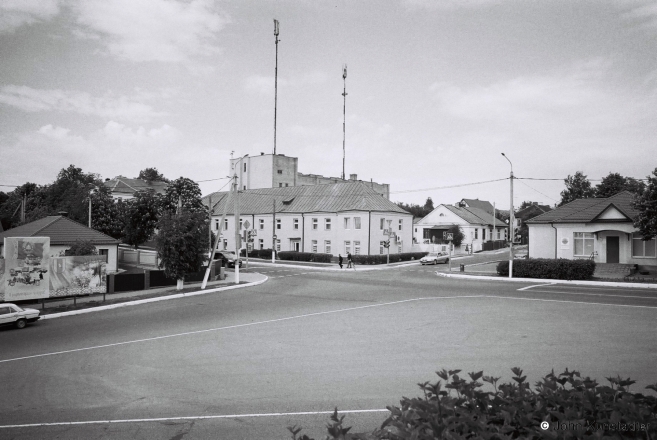Photo survey of the patrimony of Stoubtsy, a district center in western Mjensk Region, 2017.
Фотавандроўка па спадчыне г. Стоўбцы 2017 г.
The Treaty of Riga in 1921 left the central and eastern Belarusian and Ukrainian lands under Bolshevik-Soviet occupation and the western Belarusian and Ukrainian lands, known to the Poles as the Eastern Borderlands (Kresy Wsochodnie), incorporated into the Second Polish Republic.
As the border city in Poland on the Warsaw-Moscow railroad, Stoubtsy became a showcase for Poland versus the ever grimmer Soviet regime. Thus in the 1920s-30s the Polish authorities built a series of county administrative buildings, a high school, border-guard barracks, apartment buildings and semi-detached and detached houses using the newly developed national style of Functionalism. The style used alternatively elements similar to other contemporaneous modernist styles (constructivism, rationalism, art deco) and the Polish Zakopane style.
Fortunately much of this patrimony has survived in Stoubtsy, although some in a neglected state — see Belarusian historian Uladzimir Sadouski’s excellent blog entry on Stoubtsy (https://kresy-arch.livejournal.com/30694.html) as well as the rest of his outstanding series on the interwar architectural patrimony of the Eastern Marches (https://kresy-arch.livejournal.com/).
Падчас Другай Рэчы Паспалітай значнасьць Стоўбцаў, як памежнага паветавага цэнтра, павялічылася, ды польскія ўлады пабудавалі цэлы шэраг урадавых забудоваў, гімназію, жылых корпусаў і дамоў у новым, нацыянальным стылі функцыяналізму.
На шчасьце значная частка гэтай спадчыны захаваласяб хоць і часткова ў занядбаным стане, да сёньняшняга дня. Гл. выдатны артыкул беларускага гісторыка Ўладзіміра Садоўскага пра міжваенную спадчыну Стоўбцаў (https://kresy-arch.livejournal.com/30694.html) ды ўсю яго каштоўную творчасьць пра міжваенную спадчыну Ўсходніх крэсаў (https://kresy-arch.livejournal.com/).
Polish-era police station (right-hand side of building in the center of the photo), heavily rebuilt during the Soviet occupation and now serving as a post office.
Паліцэйскі ўчастак польскіх часоў (правы бок забудовы ў цэнтры фотаздымку), значна перабудавана падчас савецкай акупацыі, зараз пошта.
